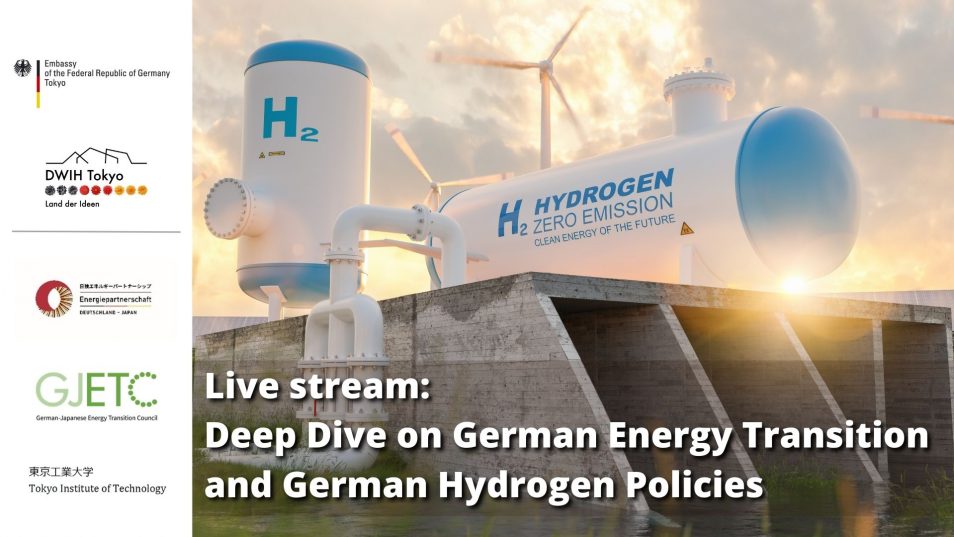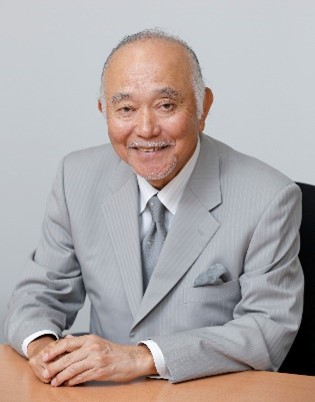Deep Dive on German Energy Transition and German Hydrogen Policies
 © DWIH Tokyo
© DWIH Tokyo
The climate crisis requires urgent action to transform our entire economic and social system towards net-zero. International cooperation, and partnership between governments, science, industry, and civil society are vital to this effort, especially to the transformation of our energy systems. Japan was the first country worldwide to introduce a national hydrogen strategy in 2017 with the goal to facilitate a global hydrogen supply chain. Germany, as one of the pioneers in a green energy transition, has published a national hydrogen strategy in 2020 with a strong focus on green hydrogen. The decarbonization of the industrial sector with the help of hydrogen is one of the cornerstones in the national strategies of Japan and Germany in order to achieve climate neutrality by 2050 and 2045, respectively.
In addition to the Energy Partnership of the Federal Ministry for Economic Affairs and Climate Action and the Ministry of Economy, Trade and Industry, the scientific dialogue has been intensified through the German Centre for Research and Innovation Tokyo (DWIH Tokyo), and the German-Japanese Energy Transition Council (GJETC).
On March 1st, a keynote lecture and discussion between two of the most relevant experts in this field from Germany and Japan will be streamed live on the DWIH Youtube channel: Dr. Felix Chr. Matthes, Research Coordinator for Energy and Climate Policy at the Öko-Institut – Institute for Applied Ecology, will provide an overview of the latest developments in the field of hydrogen ramp-up in Germany, followed by comments and discussions with Prof. Takao Kashiwagi of the Institute of Innovative Research, Tokyo Institute of Technology.
Event Information
March 1, 2023, 3:00 PM to 4:30 PM
Online
Organizer(s): Embassy of the Federal Republic of Germany in Japan, DWIH Tokyo
Time: 15:00-16:30 (JST) / 07:00-08:30 (CET)
Language: English
Supported by: The German-Japanese Energy Partnership, German Japanese Energy Transition Council, Tokyo Institute of Technology
Recording: https://youtube.com/live/x-kS3fe8Mog?feature=share
【Program】
15:00-15:10 JST / 07:00-07:10 CET
Greetings
- Clemens von Goetze, Ambassador of the Federal Republic of Germany
- Axel Karpenstein, Director of DWIH Tokyo and DAAD Tokyo
15:10-15:40 JST/ 07:10-07:40 CET
Keynote by Dr. Felix Chr. Matthes, Research Coordinator for Energy and Climate Policy at the Öko-Institut – Institute for Applied Ecology
- The keynote provides an overview of the latest developments in the field of hydrogen ramp-up in Germany. On the one hand, it describes the revision of the National Hydrogen Strategy as well as the particularly interesting new approaches in this strategy. On the other hand, insights are presented on the support mechanisms that are about to be introduced in the areas of Carbon Contracts for Difference (CCfD) for industry, infrastructure planning and implementation as well as the import of hydrogen derivatives. The presentation combines in-depth background information on the strategic lines of the latest German hydrogen policies with insights from the engine room of policy support mechanisms for the hydrogen ramp-up.
15.40-16:10 JST / 07:40-08:10 CET
Comments and Questions by Prof. Dr. Takao Kashiwagi, Specially Appointed Professor/Professor Emeritus, Tokyo Institute of Technology/Zero Carbon Energy Institute GXI Supreme Advisor
16:10-16:30 JST / 08:10-08:30 CET
Q&A & Discussion
【Speakers & Panelists】
 Dr. Felix Chr. Matthes, Research Coordinator for Energy and Climate Policy, Öko-Institut – Institute for Applied Ecology
Dr. Felix Chr. Matthes, Research Coordinator for Energy and Climate Policy, Öko-Institut – Institute for Applied Ecology
German Hydrogen Council and German-Japanese Energy Transition Council (GJETC)
- Felix Chr. Matthes holds a degree in electrical engineering (Leipzig University of Technology) and a doctorate in political science (Free University Berlin). After having worked in the industry, he joined the Öko-Institut in 1991 and has become research coordinator for energy and climate policy in 2009. His research and consulting work focuses primarily on climate neutrality strategies, energy market design, the design and evaluation of policy mix concepts with special consideration of carbon pricing, as well as technology-specific issues of system analysis (infrastructures, coal, nuclear energy, hydrogen) in Germany, Europe and internationally (especially in Asia and the USA).
- He serves as member of various advisory boards of companies and institutions as well as high-ranking political advisory bodies. In 1993, he was a Fellow of the German Marshall Fund of the United States in the USA, and in 2007 and 2008 he was a visiting scientist at the Massachusetts Institute of Technology (MIT) in Cambridge, MA.
- He is a member of Germany’s National Hydrogen Council, where he heads the Working Group on Production, Imports and Integrity Safeguards. In addition, he is currently intensively advising the German Federal government in projects on the design and implementation of support mechanisms for the ramp-up of hydrogen use in the emissions-intensive industry and the energy sector.
 Prof. Dr. Takao Kashiwagi, Specially Appointed Professor/Professor Emeritus, Tokyo Institute of Technology
Prof. Dr. Takao Kashiwagi, Specially Appointed Professor/Professor Emeritus, Tokyo Institute of Technology
Zero Carbon Energy Institute GXI Supreme Advisor
- After receiving his doctorate at the Department of Production Mechanical Engineering of the Tokyo Institute of Technology (Tokyo Tech), in 1979, he worked as a visiting researcher at NBS of the U.S. Department of Commerce, an associate professor at the Faculty of Engineering, Tokyo Institute of Technology, and a professor at the Graduate School of Tokyo University of Agriculture and Technology. From 2007 until 2012, he was a professor at the Graduate School of Tokyo Institute of Technology and became honorary professor in 2012. In 2022, he was appointed as Supreme Advisor of the Zero Carbon Energy Institute of the Green Transformation Initiative at Tokyo Tech.
- Since 2011, he has been the Chairman of the Cogeneration Foundation and has been appointed as Program Director of the Cabinet Office Strategic Innovation Promotion Program (SIP) in 2018. Currently, in addition to serving as chairman of the Energy Conservation and New Energy Subcommittee of the Ministry of Economy, Trade and Industry, he is a member of the Basic Policy Subcommittee and has been deeply involved in policy making through various other committees of the Cabinet Secretariat, the Ministry of Land, Infrastructure, Transport and Tourism, the Ministry of Internal Affairs and Communications, and the Ministry of the Environment. In 2017, he was the first Asian to receive The Georg Alefeld Memorial Award, the most prestigious international award in the field of energy and environment. His major publications include “Super Smart Energy Society 5.0”, “Smart Revolution”, “Energy Revolution”, and “Cogeneration Revolution”.
The DWIH Tokyo newsletter provides timely information about open calls and events from research and innovation in Germany and Japan: Click here to register for the newsletter in English
